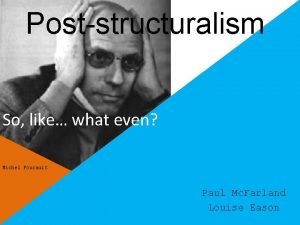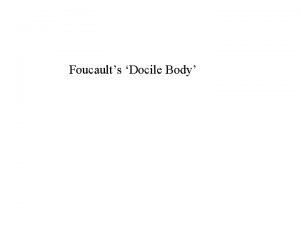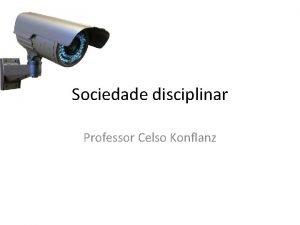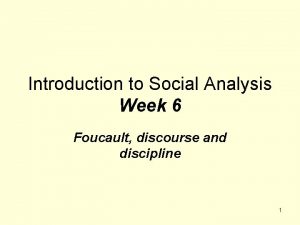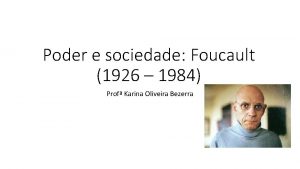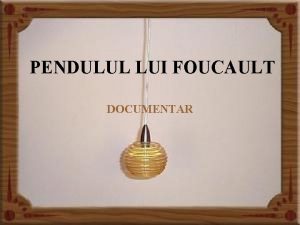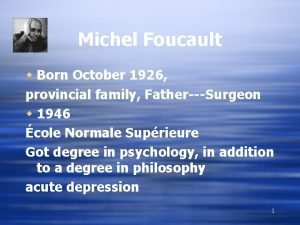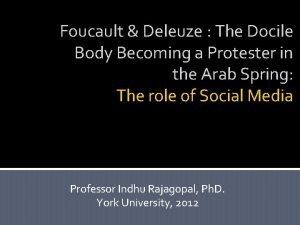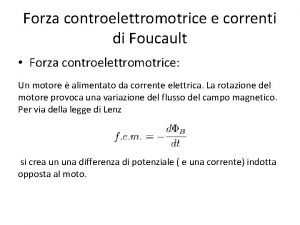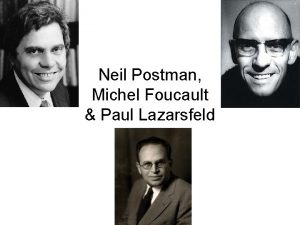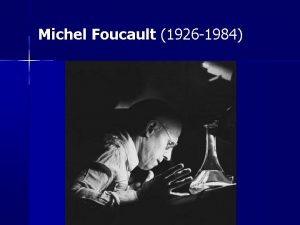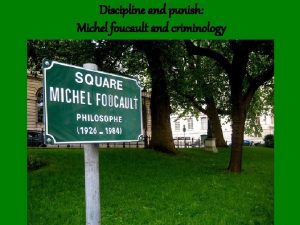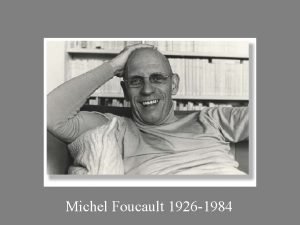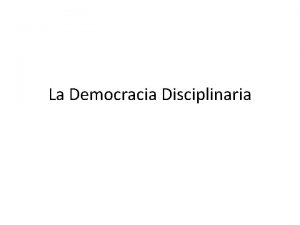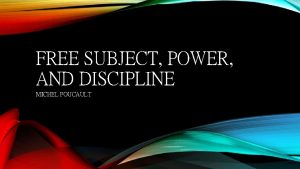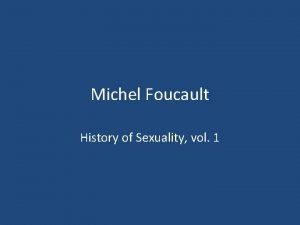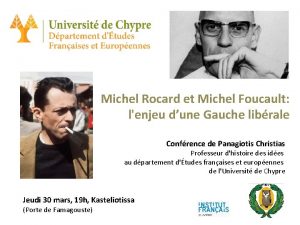1 2 MICHEL FOUCAULT POWER STRUCTURE AND HISTORY
















- Slides: 16

1

2 MICHEL FOUCAULT, POWER STRUCTURE AND HISTORY OF SEXUALITY

3 MICHEL FOUCAULT ( 1926 -1984 )

MICHEL FAUCAULT 4 • He was cited as post- structuralist and post modernist, he rejected this labels prefering to present his thought as critical history of modernity • His theories addressed relationship between power and knowledge and how they are used to form a social control through social institutions • French Philosopher, Historian of ideas, social theorist, philologist and literary critic

MAJOR WORKS 1. HISTORY OF MADNESS IN THE CLASSICAL AGE ( 1961 ) 2. THE BIRTH OF THE CLINIC ( 1963 ) 3. LES MOTS ET LES CHOSES ( THE ORDER OF THINGS ) 4. FROM ARCHAEOLOGY TO GENEALOGY 5. DISCIPLINE AND PUNISH 6. HISTORY OF SEXUALITY 5

6 POWER STRUCTURE Foucault argues a number of points in relation to power and offers definitions that are directly opposed to more traditional liberal and Marxist theories of power • Power is not a thing but a relation • Power is not simply repressive but it is productive • Power operates at the most micro levels of social relations. Power is omnipresent at every level of the social body

7 TYPES OF POWER SOVEREIGN POWER DISCIPLINARY POWER It involves the obedience to the law of the king or central authority figure It is a mechanism of power which regulates the behavior of individuals in the social body. This Is done by regulating the organization of space, of time and people’s activity and behavior BIO POWER It is a technology which appeared in the late 18 th century for managing populations. Bio power is about managing the births, deaths, reproductions and illness of the population

Two ideas are the core of Foucault’s methodology; 8 1. Archaeology of knowledge 2. Geneology of power He seeks knowledge generating power by consulting people as subjects and then governing the subjects with the knowledge

9 • He is critical of the hierarchization of knowledge • He is interested in techniques, the technologies that are derived from knowledge and how they are used by various institutions to exert power over people • He sees history lurching from one system of domination ( based on knowledge ) to other • He believes that knowledge-power is always contested, there is always ongoing resistance to it

10 • Exercise of power itself greater and causes to emerge new objects of knowledge and accumulate new bodies of information • In other words both are ‘integrated with another’ • Power constructs and dominates at the same time as it aims to know. Thus knowledge engenders power which in turn cannot be exercised without knowledge

11 • He saw power as the determinant of what are called truth and knowledge • History is no more than a fiction of narrative order imposed on the irreducible chaos of events in the interests of the exercise of the power • Universal truth in the name for power disguised as the criterion of all knowledge

12 • Discipline and punish, Foucault’s discourse on the penal establishments, is also an account of the interaction of knowledge and power • Along with other social theorists, he believe that knowledge is always a form of power • He told us that knowledge can gained from power; producing it not preventing it

13 Panopticon * in his view, power and knowledge come from observing others. The result of this surveillance is acceptance of regulations and docility * for him the real danger was not necessarily that individuals are repressed by the social order but that they are carefully fabricated in it

14 THE HISTORY OF SEXUALITY • The history of sexuality is a three volume study of sexuality in the western world • He examines the way the sex is putting to discourse and the way that power penetrates that discourse

15 • The first volume; “The will of knowledge” was published in 1976, criticized the repressive hypothesis • In volume second and volume third, he addressed the role of sex in Greek and Roman antiquity

16
 Post structuralism in architecture
Post structuralism in architecture Discontinuidad
Discontinuidad Michel foucault docile bodies
Michel foucault docile bodies What is an author michel foucault
What is an author michel foucault Michel foucault magt
Michel foucault magt Michel foucault
Michel foucault Michel foucault
Michel foucault Pontologia
Pontologia Michel foucault critical theory
Michel foucault critical theory Michel foucault summary
Michel foucault summary Poder para foucault
Poder para foucault Pendulul lui foucault
Pendulul lui foucault Foucault family
Foucault family Foucault friendship as a way of life
Foucault friendship as a way of life Panoptico foucault
Panoptico foucault Foucault docile bodies
Foucault docile bodies Correnti di foucault applicazioni
Correnti di foucault applicazioni
